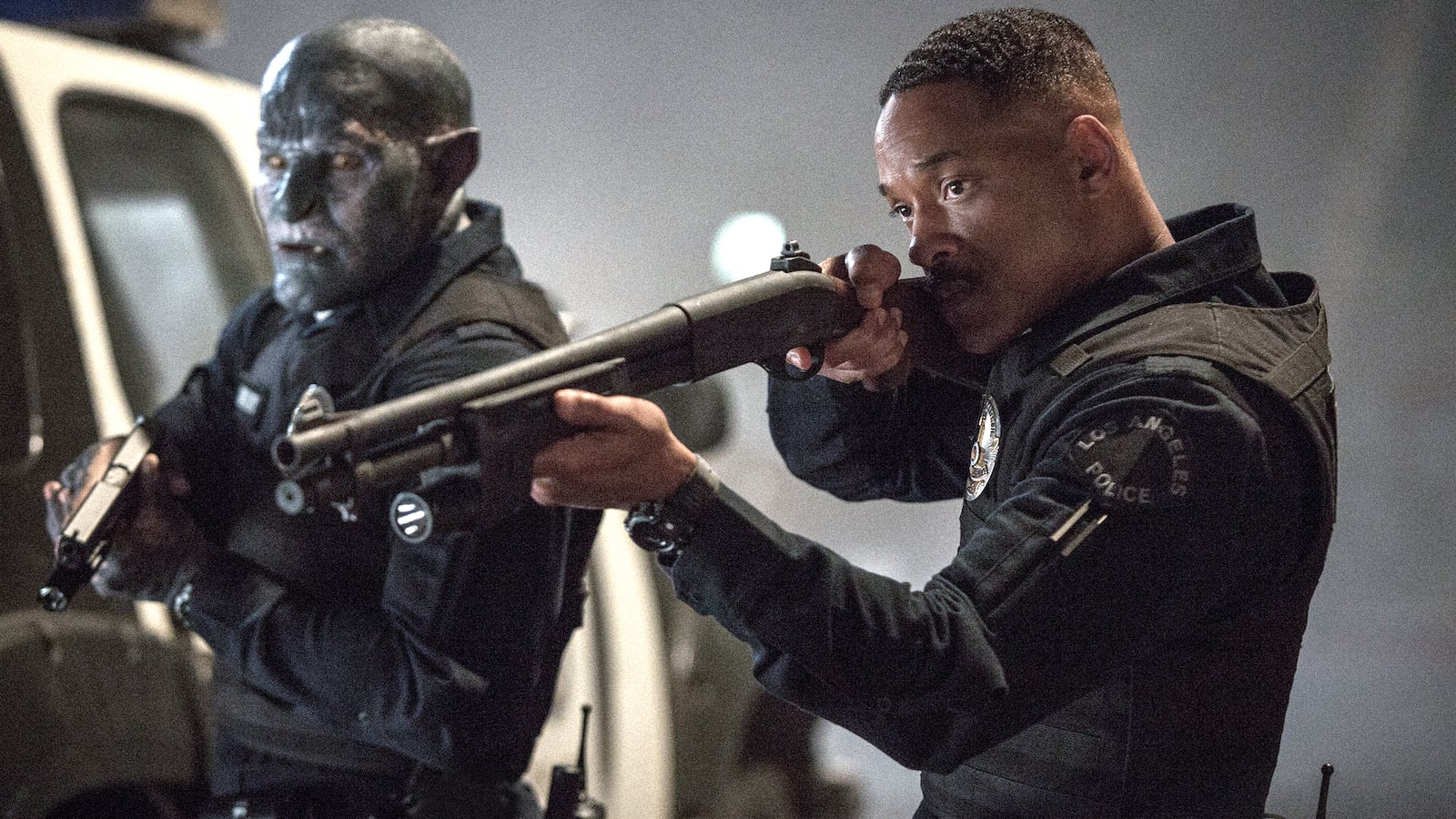Bright is a misnomer on two levels. First of all, the majority of Netflix’s new $90 million original movie takes place at night and in fairly dingy rooms, and that, in combination with how the whole production is lit, means that most of the action is obscured and visually unintelligible. Secondly, there’s nothing about this movie that’s an inherently good idea—or rather, very generously speaking, maybe the story could have made some valid points about the state of race relations in America with a little more thought. But as things stand, Bright plays like the kind of movie a kid might make up (“And then this happens! And then this happens!”) if they were given a very rough overview of American history and then told to write a script about it. It’s almost worse that that’s not the case—scratch that, it is worse—but we’ll get to that.
Directed by David Ayer (Suicide Squad) and written by Max Landis (Victor Frankenstein), Netflix’s new original movie is perpetually surprising in how off the rails it goes in terms of intent versus execution while also managing to be entirely predictable. Of course there’s a prophecy. Of course nobody’s actually going to die. Of course there’s a sequel set-up. On and on, there’s nothing particularly surprising about this movie, and the drab plot and visuals only make the storytelling missteps harder to ignore.
Set in present-day Los Angeles, Bright posits a world where orcs, elves, and humans (and centaurs, though I only saw one) have co-existed for thousands of years. Of course there are tensions between the races due to old conflicts that have never really been worked out. When LAPD officer Ward (Will Smith) is paired with the nation’s first orc officer, Jakoby (Joel Edgerton, unrecognizable under a mountain of prosthetics), tensions naturally ensue. So, orcs are perceived as thugs, elves are the one percent—there’s an entire “elven district”—and humans are, I guess, somewhere in between. It’s an idea that makes sense in, say, a freshman creative writing class, but not one that even remotely begins to work in this context.
The fact that orcs—a breed of monster that are generally known for brutishness and being both villains and cannon fodder in The Lord of the Rings—are essentially meant to take the place of African Americans in Bright’s attempt at unpacking race relations is a huge problem on its own, and begs even more questions in terms of what Landis was trying to do when actual race-relation problems still seem to exist in this fantasy-L.A.
In one scene, Will Smith snaps at his black neighbors, telling them to keep “doing all your gangster stuff,” suggesting that their presence is making it difficult to sell his house. Then there’s the Latinx gang, headed by Enrique Murciano sporting the nickname “Poison” and a face full of tattoos, who form the only other contingent of actual people of color in the entire movie. As a bunch of stereotypes thrown in with other stereotypes—given the way the orcs dress pretty much exactly the same as they do—where are they meant to fit in? It’s impossible that they’re nonexistent. At one point, a cop responds to an orc’s complaint about discrimination by telling him not to complain: “Mexicans still get shit for the Alamo.”
This is also a problem in that the other fantasy races are a non-presence. There’s no look into the lives of elves, or centaurs, or fairies (one of whom Ward kills in the movie’s bafflingly tone-deaf first scene as he declares, “Fairy lives don’t matter today”), to the point that I almost couldn’t help but wonder if working fantasy species into this story wasn’t just an excuse to not have to deal with any “real” politics and try to come off as progressive or edgy as a result, or a sort of cover-up to disguise the fact that this is a movie about racial discrimination and struggle written by a privileged white man (the son of John Landis) lacking any grasp of race relations.
Apart from Smith and Edgerton, each of the other characters have about five lines apiece, including big bad Leilah (Noomi Rapace, who has the mixed blessing of being the only “cool” character in a movie this dismal), MacGuffin Tikka (Lucy Fry), and Edgar Ramírez as an elf federal officer. Given the caliber of the dialogue they do get, maybe that’s for the best. All of the dialogue—and all of the music—seems to have been stolen from a second-rate video game. It’s enough to suck the life out of the usually-charming Smith; Edgerton is the only one in the cast who still seems to be really trying, which works in that you can’t help but feel sorry for him as he continues to leap through hoop after hoop, his earnestness so clearly placing him in an entirely different movie.
The jokes that pepper the script are dreadfully unfunny, then again this is a movie where Will Smith mows down a row of racist (fantasy-racist?) cops to the Bastille power ballad “World Gone Mad,” right as the lyrics “you don’t wanna fuck with us” are sung.
Despite all of this, Netflix has already greenlit a sequel. Hopefully, though, that announcement won’t act as your barometer. Bright is an unforgivable mess, and not in a way that’s fun to watch. If you’re home for the holidays and looking through Netflix for something bad-good to watch, do yourself a favor and pick something else. Maybe Pottersville. Life is too short to spend on a movie like this.






